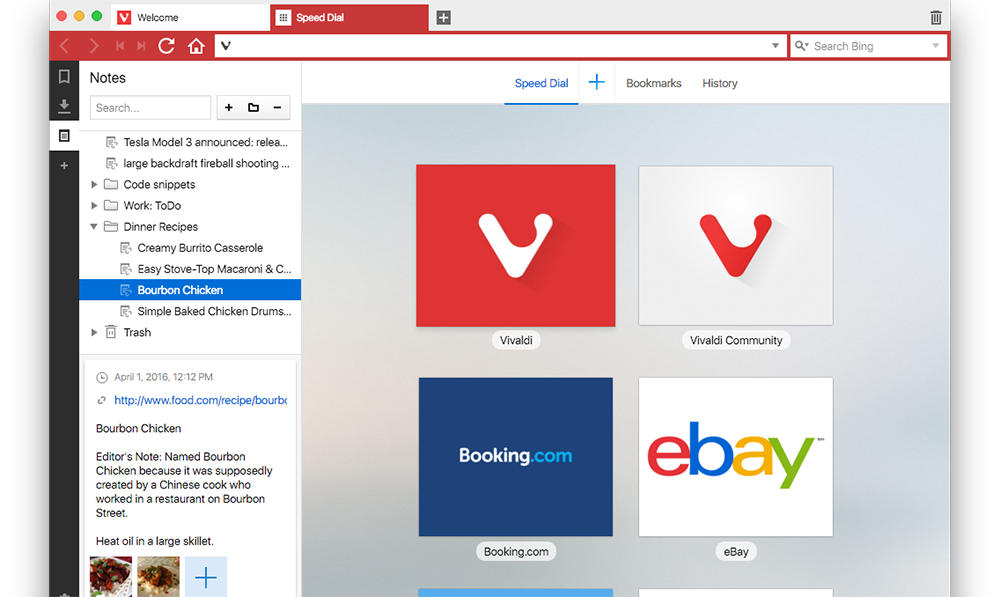Q&A: Vivaldi lighting up browser market for power users
We speak to Tatsuki Tomita, COO and co-founder of Vivaldi, to find out what it can offer power users


It's been six months since Vivaldi hit the browser market, and while it may not be grabbing much market share from Chrome et al it's on about 0.03% globally, according to StatCounter it's finding ways to light up the market.
Literally, we mean. One of Vivaldi's features is that it picks up the colour scheme from the pages you visit; that's been tapped and linked to Phillips Hue smart lightbulbs, letting the browser control your home lighting theme.
While that's perhaps not the most useful feature especially in an office setting it highlights the different road Vivaldi's developers are taking, adding features in as other browsers opt for a more stripped down, Spartan approach. It's a road previously taken by the Opera browser, and Vivaldi was founded by developers who departed that project.
On the sidelines of the Slush startup conference in Helsinki, IT Pro spoke to Tatsuki Tomita, co-founder and COO of Vivaldi, to find out more.
Why did you have Vivaldi integrate with smart lighting?
It's one of those things, we did it because we can. In the initial implementation it connected to the browser and depending on the [browser] theme colours or time of day, it controlled automatically your lightbulbs.
But if you think about it, there are so many more things you can do [notify via lighting] if you get a Facebook message, if you're entrepreneurs and you get email from investors maybe make it glowing red. There are so many things we can do. We've been able to implement a functionality that's unique, and that no other browser is able to do. We've been able to add functions that are requested by power users, which are the core target audience we have.
Sign up today and you will receive a free copy of our Future Focus 2025 report - the leading guidance on AI, cybersecurity and other IT challenges as per 700+ senior executives
What other new features are you developing?
We've been working on projects that are more time consuming, like sync functionality that lets you synchronise your bookmarks and data across different installations of Vivaldi and pre-integrated email clients into the browser.
We're constantly working on speed improvements as well as being as memory efficient as possible, the typical user we think of could have 50 or more tabs open. When I talk to other people, why do I need a new browser that's the question I get. It's already pretty good but we want it to be better... if the performance isn't better than everyone, it's just a bug we need to fix.
The mobile version is another thing that we've been working on. People tell us the things they want us to do, saying if you do this, I'll make a full switch to Vivaldi.
And are those your target audience of power users?
On the Slush flight [from San Francisco to Helsinki], I tell people what I do and listen to what they do, and they say "that's my browser" so it seems like we're hitting the core of the audience.
We're still continuing to focus on designing the browser for power users, but I think our product has a broader appeal. Out of the box, there's nothing there to scare most people. It's a very sleek and modern-looking interface. But if you want to customise your experience there are so many options. The further you dig, you discover more and more functionality. We need to kind of work on the discoverability of that functionality, but out of the box, it definitely has appealed to a much broader audience.
But we're still communicating the value of the product to the target audience, but that doesn't exclude anyone. One of the things we've been thinking about from the marketing perspective is that we try to convince the target audience, who will hopefully tell the others, less technical users who may not be looking for another browser. It's not the main concern for average users, they're not looking for a new browser every day. Technical users have very specific needs, very specific things they want to be able to do with a browser.
Rival browsers are increasingly stripped down, why are you taking the opposite road?
We're contrarian, we try to go in the opposite. There's no reason for a user to use another browser if we just look the same as any other browser. So we're trying to find our niche. We're highly differentiated from other browsers that are out there, but also we are basically making a browser that we really like and for people like us. That was the main driver, but from a business perspective, it kind of makes sense to be different.
How are you different from Chrome in terms of data privacy?
The difference between Vivaldi and Chrome we use the same javascript engine if you use Google as a search engine, then everything gets sent through Google by default. By default we don't send anything to Google, we try to turn off everything. There are a couple of things we do use, such as Safe Browsing APIs, which you can turn off, there's a setting. What it does is download a list of malicious websites URLs and checks against that blacklist, but Google won't know and we don't' know what sites you're googling. It's a hashed value that we check against.
In general, we don't send your data, it's not our business model. Our business model is very simple: we do work with Microsoft and Yahoo and don't work with Google, but we do get paid every time a search is performed. We also have partnerships with eBay, so if someone uses eBay through us we get paid.
But we as a company don't track anyone's data. We try to be mindful, as some people use us because of the functionality we provide, and some because we're not Google.
Freelance journalist Nicole Kobie first started writing for ITPro in 2007, with bylines in New Scientist, Wired, PC Pro and many more.
Nicole the author of a book about the history of technology, The Long History of the Future.
-
 How the UK public sector could benefit from strategic channel partnerships
How the UK public sector could benefit from strategic channel partnershipsIndustry Insights Is the channel the answer to the growing cost vs budget problem facing the public sector?
-
 Microsoft wants to replace C and C++ with Rust by 2030
Microsoft wants to replace C and C++ with Rust by 2030News Windows won’t be rewritten in Rust using AI, according to a senior Microsoft engineer, but the company still has bold plans for embracing the popular programming language
